#doctor who analysis
Text
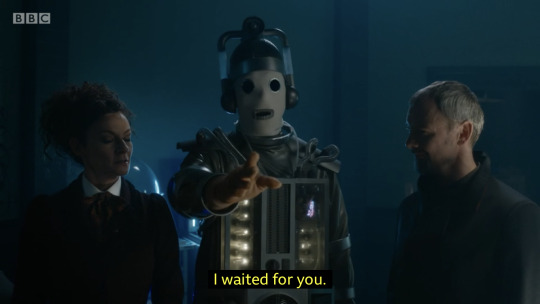
the composition of this shot... finger pointed at the doctor in accusation, bill is speaking the words but both masters are talking through her, surrounding her as witnesses as she channels their bitterness, their rage, their abandonment. the master waited for him. jack waited for him. older amy in that hospital waited for him. bill waited for him. ashildr-me waited for him. but he always came back too late. the man whose ship's engine noise is a sound that heralds hope wherever it lands left the ones he cared about behind. when hope itself leaves you behind, what redemption could you ever dream of?
#doctor who meta#world enough and time#bill potts#simm master#missy#twissy#thoschei#jamie catches up#twelve#twelfth doctor#tenth doctor#doctor who series 10#doctor who#dw#jamie.txt#doctor who analysis#tensimm
1K notes
·
View notes
Text
but is it really any wonder the 14th would break like brittle bones at the mention of the flux and the timeless child stuff.

I think most of his faces have held a sort of pride towards the timelords and Gallifrey, choosing to honour their memory and have his people be remembered fondly despite all their flaws. But I feel this face, when it was the 10th, spoke of it with the most heart. At least, more grandiosely! When he spoke about Gallifrey, it was like a legend. A promise. A promise to never rid anyone of their homes and family ever again.
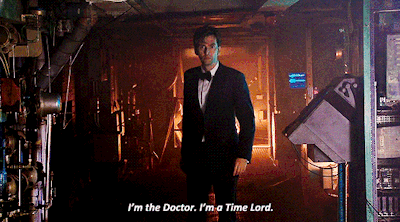


And I feel the reason the 10th clung to his origins like he did is because compared to all the other doctors, he longed for a family the most. Not a companion, but a proper family. A place to belong. A fatherly shoulder to rest his head on, a sister to ask for advice, a partner for life and a mother to scold him for mischief. which he used to have. All of it.
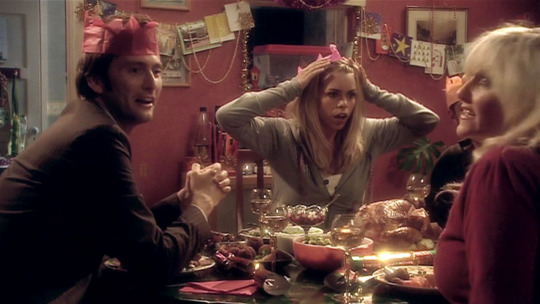
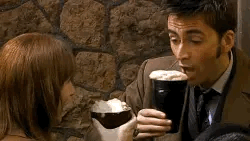
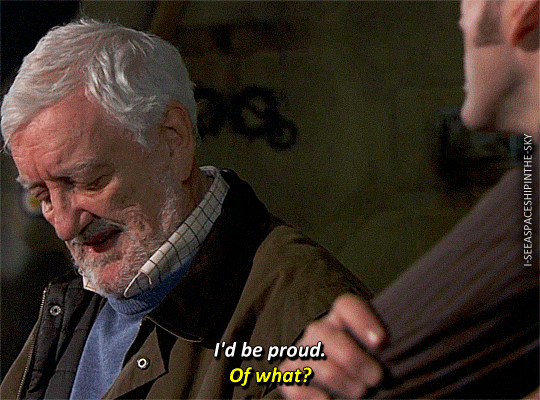
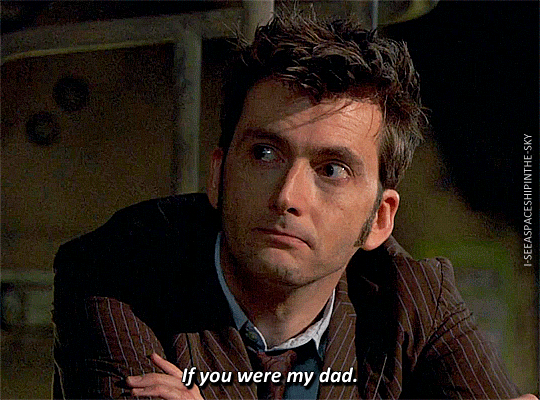
And he was forced to let go of all of it.
Then what do you do. You die and move on, now warry of ever opening up your heart that far again because deep inside a face of you knows how much it hurts to open it all the way. And still, the doctor has Gallifrey and his identity to hold onto. His only constant. A belonging lost to time yet with an unwavering connection that remains. What do you do when you lose that too, and get your old face back?
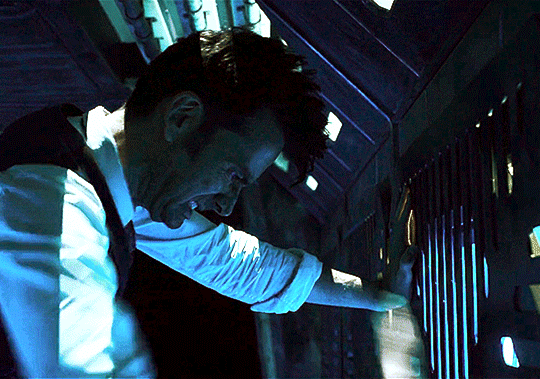
you break!
Throughout the 3 specials, the doctor is so so scared of losing Donna again. He would be any day, but now with his old face back, it's the only constant he's got left. the only slither of family he was able to save AND the only one that still remains. If she dies, that face has truly, completely, lost and ruined everything he ever dared to open his heart to back then.
Which is why the 15th knew it was so important for the 14th to stay. They may not have a solid origin anymore, but there's still a family waiting for them. And he knows very well the 14th can't carry on and leave all of it behind with the knowledge he has now.
He has to heal so the doctor can thrive. He has to come home, so the 15th can play outside.
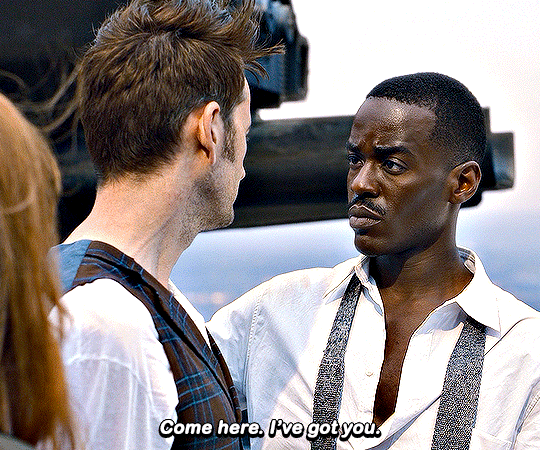
#please be kind in the comment this is an analysis on 10 specifically!#i know the other faces have a complex relationship with the people they meet too#dw 60th anniversary#dw 60th#doctor who#doctor who spoilers#15th doctor#14th doctor#10th doctor#donna noble#the doctor#david tennant#wild blue yonder#the giggle#doctor who special#doctor who special 2#doctor who 60th anniversary#doctor who donna#doctor who analysis#analysis#character analysis#the flux#the timeless child#doctor who flux
661 notes
·
View notes
Text
“But We Love Martha Jones!” - The Doctor Who Fandom’s Selective Memory of Racism
Be aware that this article contains explicit examples of anti-black racism and misogynoir.
**Contents**
Intro
1. Everybody Hates Martha
2. Utopia-ish
3. Martha vs Bill
4. Martha Triumphant?
Intro
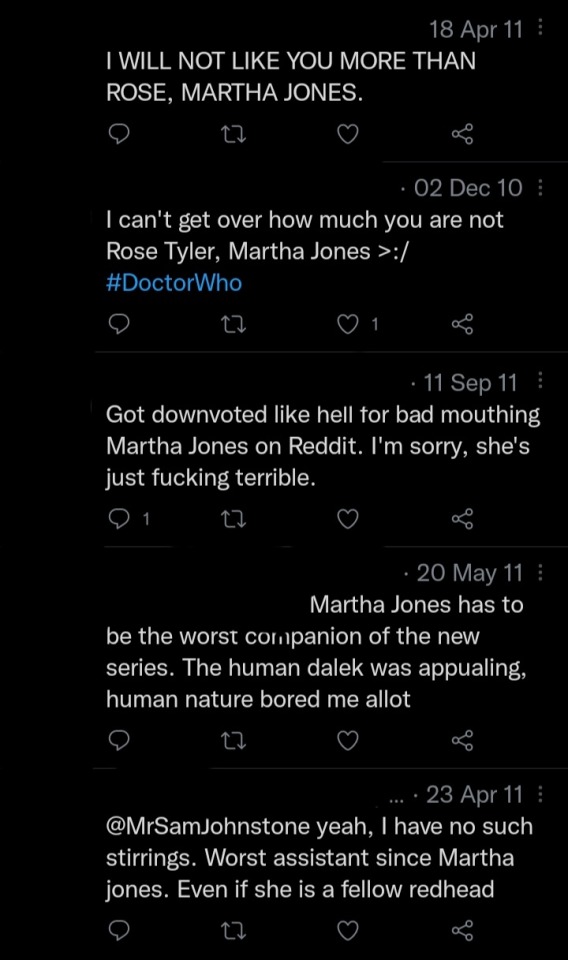
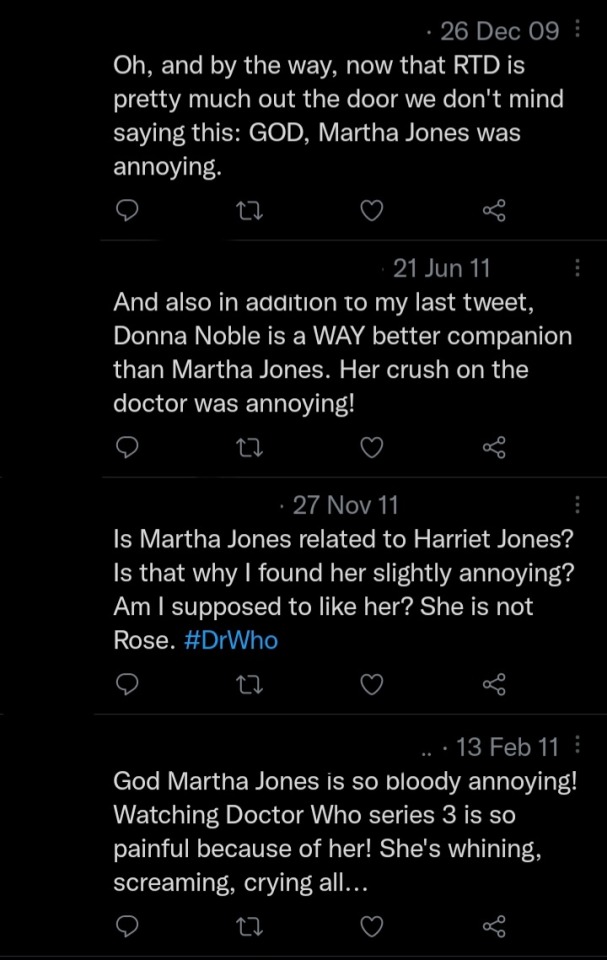
To say being a Martha Jones fan from 2007-2017 was hard would be an understatement. The fandom claimed she was too clingy. Too jealous of Rose. Too bitter. Too bad a companion. For as long as I can remember, Martha Jones wasn’t just an unpopular companion - she was THE unpopular companion. So this recent increase in “my issues with [insert companion of colour here] isn’t about race. Everybody loved Martha Jones!” has me raising an eyebrow. Freema Agyeman as part of Ofcom’s Diversity In Broadcasting Event answered a question on her time as Doctor Who’s first Black companion. She describes her time as “good and bad”. She handled the criticism of Martha as a character “but the racism… yeah, yeah couldn’t rationalise that” as she pauses in the video. In the silence we get a clear answer - Freema Agyeman did not have an easy time as Doctor Who’s first Black companion. So when I see comments about how much she was loved, or how no one knew what Freema was going through when speaking out about the racism she experienced, or “My sus posts about Ryan & Yaz aren’t racist! I loved Martha!” I, and many other Black/mixed Black fans and other fans of colour have bad tastes in our mouths. We remember the real history of how Martha Jones was treated - and her history wasn’t a kind one.

Chapter 1 ->
#martha jones#freema agyeman#doctor who#new who#doctor who fandom#doctor who analysis#dr who fandom#dw fandom#fandom racism#rtd era#rtd critical#fandom analysis#fandom history#fandom colourism#black representation#rtd#rtd1#fandom antiblackness#antiblackness#colourism
318 notes
·
View notes
Text
if the options are stop calling the ninth doctor a grumpy cunty dyke, or death, then get your eulogies ready im hopping into that casket ✨

#yes ms doctor your leather jacket is hot#doctor who#doctor who analysis#lol#ninth doctor#nine#ninerose#timepetals#christopher eccleston#dyke
79 notes
·
View notes
Text
While Donna Noble will always be my favourite companion in NuWho, Clara will always be the most multi-faceted and complex (as of now). I think that a lot of divisiveness surrounding Clara stems from 5 common criticisms:
1. Clara’s characterisation in 7B and how Moffat treats her mostly as a mystery box first and character second.
2. The length of Clara’s tenure and how some may have been fatigued due to the many times “she should have left.”
3. The emphasis on Clara’s flaws in Series 8 and how it kind of paints her as unlikable over her Series 7B depiction as at least kind.
4. Clara’s departure in Hell Bent as something that ruins her ending in Face The Raven.
5. The belief of Clara as the most important character in the Doctors life inherently devaluing other companions.
I think while I can understand the reasons leading up to these criticisms, I also think that it does help to look back throughout the Moffat and RTD era as it does help explain a lot of these points imo.
Actually, the character Clara most prominently echoes is Rose. Rose, like Clara, helped the Doctor through a time of extreme emotional vulnerability (for 9th, Time War trauma) and developed a relationship of co-dependency with him (as 10th) which never really went away even after Doomsday. Clara had the luxury of time however, and has undergone more events with the Doctor (Impossible Girl, Trenzalore, 50th Anniversary etc) but also how 12th was undergoing an extreme identity crisis of figuring out whether he’s a good man post-Trenzalore and saving Gallifrey. Clara was the one who facilitated his character growth through the turbulence of the arc in instances like Dark Water, Death In Heaven, Mummy on The Orient Express, Kill The Moon, Last Christmas etc and would naturally result in the Doctor developing an extremely unhealthy reliance on Clara as being his “carer,” his anchor to being The Doctor (refer to her whole “Be A Doctor” spiel in the 50th Anniversary). Series 9 already heavily implied the Doctor’s willingness to engage with destructive measures by choosing to separate Clara and The Doctor almost every episode (Magicians Apprentice/Witch’s Familiar) as the stakes rose and cumulated in Face The Raven.
RTD has also once said when paying tribute to Moffat:
“And nestling at the heart of the show is Doctor Who's very own problem category, the Companion, a title inherently subordinate to the Man. Until Clara comes along!”
Imo, while poorly phrased, I think does also hit another nail on the head to explain how Clara can be so compelling to someone like me but also extremely polarising. RTD is talking less about the companion being “weaker” or “submissive” but how Clara is the NuWho companion that wishes to obliterate the boundaries between the power dynamic of companion/doctor. Series 8 for instances plays on the recurring motif of, “Do as you are told” which the Doctor firstly uses to threaten Clara to keep her safe. However, Clara actively retaliates by parroting the phrase back in an attempt to attain parity. This escalates to the events of Dark Water where she attempts to maintain control of her circumstances by forcing the Doctor to be on equal ground with her. What is so fascinating is that Clara while changing and emulating more of the Doctor’s heroism, she equally begins to absorb his flaws which intensify throughout Series 8-9. Clara becomes more deceitful, egotistical, reckless and cunning as she begins to become more and more like him. The means she lies to Danny, her ability to think more and more like him.
However, what people (fans and haters) also ignore is how nuanced the circumstances are. While Clara’s flaws become more heightened, it is also a fact that she wants to be like the Doctor because of his kindness and heroism. Episodes like Robots of Sherwood, Last Christmas or even Rings of Akhten reveal a lot about how Clara reveres the Doctor as a mythic and heroic figure. Clara’s attitudes towards the children in Forest Of The Night, Name Of The Doctor and Into The Dalek reveal that in spite of her ego and selfishness, she is someone who desires to help people. Thus, her desire to become the Doctor becomes more explainable. What a lot of people can’t really accept is that she can be both egotistical, reckless and kind at once. Her actions in Face The Raven were driven out of the fact that it came from a place of ignorance and impulsiveness (not stupidity, the Doctor would do something similar, it’s just that Clara did not have all the clues) in what she believed would be what the Doctor would do and that she was confident she could match the trickery of the Doctor, and yet it was also driven by her compassion towards Rigsby and her while impulsive, sincere desire to save her friend.
Clara is punished because of this, she forgets that she’s far too human. The Doctor is less breakable. She pays for it and as Ashildr says in Hell Bent:
“She died for who she was and who she loved. She fell where she stood. It was sad. And it was beautiful.”
She died due to her physical fragility, her ego, her ignorance, her impulsiveness/recklessness and yet she also died because she was too brave, she died like the Doctor, who she loved (literally look at how her arms were outstretched as though she was mid-regeneration and how the black smoke parallels the orange glow of regeneration). However, this leads to the fourth main criticism I prior stated, so how does one answer that in relation to her character?
The answer is what Clara does and what the Doctor says towards the end of Hell Bent. Clara after being extracted and is with the Doctor in the TARDIS, spies on him because she is instantly suspicious of his erratic behaviour. Again, Clara shows how much she has become like him, she immediately picks up that he is hiding something because she has begun to think like him. Of course, the Doctor was planning on wiping Clara’s memories similar to what he did to Donna. But what does Clara do? She immediately reverse the polarity of the device that the Doctor was going to use on her and challenges the Doctors actions. Clara states:
“Tomorrow’s promised to no one, Doctor. But I insist upon my past. I am entitled to that. It’s mine.”
Clara’s language indicates her assertiveness and also a kind of last hurrah in her game of parity. She is refusing to submit to the narrative of being reduced to merely a companion that the Doctor moves away from. But more importantly, the Doctor after pressing the device and is losing his memory, states:
“Run like hell because you always need to. Laugh at everything, because it’s always funny (…) Never be cruel and never be cowardly. And if you ever are, always make amends (…) Never eat pears. They’re too squishy. And they always make your chin wet. That one’s quite important. Write it down.”
I think on initial viewing when the show was airing, this wouldn’t make much sense but this really shows the crux of how Hell Bent completes Clara’s arc and the necessity of her resurrection. In Face The Raven, the Doctor tells Clara that she’s more breakable as she questions why she can’t be as reckless as him. However, now the Doctor is instead telling her what would later be repeated in Twice Upon A Time, his regeneration speech. In his eyes, Clara has succeeded in graduating from the Magicians Apprentice and into becoming the Magician herself. He’s instructing her how to properly be The Doctor. As I said, Clara was also motivated by her desire to be kind when she engaged in her reckless gambit but what is so wrong about the desire to be kind? And why should Clara be punished for it? Thus, while Clara MUST die, her final act of kindness at the end of her arc enables the Universe to allow for Clara’s final transformation into the Doctor.
Clara is still dead, it is an unchanged historical event. However, to challenge the status quo and allow for Clara’s ascension, Clara becomes a fairy tale herself. Her body is caught in a permanent form of stasis, signalling her departure from the limits of her physicality (subverting her physical fragility) but also as seen through her last words to the Doctor:
“You said memories become stories when we forget them. Maybe some of them become songs.”
Clara has successfully become what she admired, a myth, a fable. She has become a symbol in a story, a story that would go on to have an infinite number of other stories. She has become the leaf she raises to the monster in the Rings of Akhten, she sails off into narrative ambiguity but also infinity. Clara is so polarising because she challenges the definition of what it means to be The Doctor on a pure metatextual level. It’s a logical progression from the introspection of the question from the Doctor himself in Series 8. To want to resist, I argue, is natural.
I could explore further about her adrenaline addiction in Mummy On The Orient Express or these traits I raised explored in Flatline which I may do another day, but I hope I have provided a new perspective on Clara Oswald.
#clara oswald#jenna coleman#peter capaldi#doctor who#dw series 9#doctor who analysis#character analysis#dw series 8#Steven Moffat#rtd#twelfth doctor#doctor who meta
108 notes
·
View notes
Text
Doctor who hot take incoming. A lot of people are like, “Doctor who has always been left where the heck did all these conservative complainers come from? I bet they’re fake fans,” and while I do understand this sentiment, I also think new who does have a more conservative bent in some areas than classic. This is an American perspective so take it with a grain of salt.
In s2’s tooth and claw, the Doctor and Rose, with help from Queen Victoria herself, fight a werewolf in one of the queen’s castles in Scotland and the Koh-i-Noor diamond saves the day.


Meanwhile in classic who s16’s the Pirate Planet, the Doctor, Romana, and K9 find a planet that travels across the universe pillaging and capturing other worlds all to prop up/extend a nearly dead queen’s life and increase her power. They save the day by destroying the bridge, as in what is controlling and allowing the planet to move like this, and the queen herself.
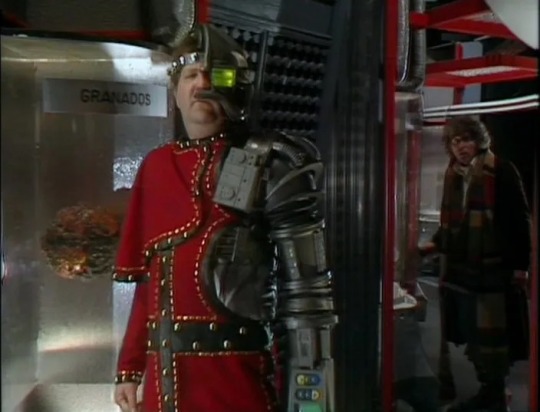

In new who, the spoils of colonialism and imperialism save the day.
In classic who, destroying the mechanisms of colonialism and imperialism saves the day.
I’m not saying this was an intentional shift. But it is noticeable and why I think some conservatives have gravitated towards New Who specifically.
And I realize the counter argument is that this is s2, there are 11 other seasons you can look at where they grew past this. But based on what I’ve seen so far I’m honestly not sure about that. (I just finished Hellbent) But that’s a whole other argument that can be saved for another time. My point is that in new who’s most popular era, the 10th Doctor, this is the subtext, intentional or not. And I am not trying to say classic who is some bastion of leftism. My point is more there is a nationalist bent in new who. So it’s not a stretch to see why it’s got conservative fans.
#doctor who#classic who#classic doctor who#new who#nuwho#Doctor who discussion#hot take#Doctor who analysis#I could also bring up the christmas invasions ending but I’ll leave it here cuz that’ll turn into a whole other thing#the pirate planet#tooth and claw#doctor who meta
85 notes
·
View notes
Text
I don't know if anyone has pointed this out yet but the entire Midnight episode from Doctor Who is e perfect example of society. I'll go by character because I can't write essays for shit and it's more fun to read this way.
Professor Hobbes: Starting with probably the more obvious one. Professor Hobbes. A white middle-aged man who's defining characteristic is his broad and unwavering knowledge of the world. Or knowledge that he thinks is correct of the world. This is a man who is so blinded by his ego that he can't see what's right in front of him, even so far as using his arrogance to cover up his fear of what is actually happening. This is a man who would rather remain in denial even in a life-threatening situation than accept that his view of the world is potentially wrong. That self-confidence burrows so deep down that it has created a self-defence mechanism for him, it's how he deals with it, how he deals with danger, by reverting back to his brilliance and intelligence and the fact he is all-knowing with a cleverness no one can match. It leads him to demean other people as well, those who dare question him... not even for one moment does he pause to think maybe they're right... something we see churches do more and more every day... The world is aflame and yet they're still in denial and have utter faith that their God (his intelligence) will save them relying on old and washed out world views that hold no water in modern society.
Dee Dee Blasco: And that leads us to Dee Dee, his apprentice. Or should we say the one who actually understands what is happening but is constantly put down by Hobbes. It is proved multiple times in the episode that her knowledge of chemistry and physics is quite vast, and at times even superior to Hobbes'. It is no coincidence that Hobbes is a white middle-aged man and Dee Dee is a young black woman who dares challenge the professors word, kind of like how the younger generations are calling out the hypocrisy of religion more and more, backing it up with solid real scientific evidence, but being repeatedly silenced, ridiculed and embarrassed for it.
Jethro Kane: Speaking of young generations, the other representative is Jethro. A young boy, a teenager, who, despite his appearance, is very highly intuitive. He might appear aloof, unserious, disinterested, and downright unremarkable. But out of everyone, he has the most accurate image of what is happening. He might be young, but he is very intelligent, despite constantly being told to shut up, that he shouldn't be speaking, that his opinion is worthless and unwanted. Treatement very similar to the treatment younger generations get from the older ones, despite more often than not being the voice of reason and getting a grasp on the real picture yet still being constantly bellitled by the older generations. "Don't be stupid, Jethro," said to him by his own mother. The ridicule eventually gets to him as well as the pressure and stress of the whole situation itself, which leads him to contemplate even murder. Eventually, in the end, he succumbs to the panick, he doesn't know what to do, and he breaks down. Not his own fault, but mostly due to the actions and the utter chaos the older generations caused around him. And that sounds awfully familiar...
Val and Biff Kane: The couple. The picture perfect representation of a loving family. Except deep down, they are selfish and rotten. Val only thinking about herself and how the Entity is stealing her voice despite everyone experiencing the same thing, not caring about anyone else and repeatedly making her voice the loudest in the room, not listening to reason and persisting her rants even though it's making the situation worse. Biff being the typical patriarchal male of the house, the first one to resort to violence and even shaming Hobbes for "not being a real man" as if murder is the logical expectation of men, as if homicide is what makes you a real man. These two are the prime example of the nuclear family who follows society's traditions on behaviour and appearance, painting themselves as the perfect example of how every couple should look, buying in all the bullshit the media is selling them, while deep down being terrible and narcissistic people. Val, going so far as to gaslight the man, she and her husband just tried to kill not even 10 seconds ago in an attempt to save her own image.
The Doctor: Now. The Doctor. The scientist. The thinker of the group. He is the spark that lights the flame. The light in a room devoid of it, that illuminates everyone's hidden and dark side. The side everyone tries to keep secret, even from themselves. The one whose kindness brings that side out and causes panick and self-inflicted chaos as they attempt to shove that darkness down and out of sight. Bringing the nastiness out of them as if they were a piece of transparent glass. And it causes absolute chaos.
The Doctor is a symbol of wisdom, common sense, and worst of all... kindness. He is the one speaking logic, speaking the obvious, showing goodness, doing the humane thing... but no one listens. Everyone around him, being in a fit of horrified panick, turns on him because they don't want to deal with their own nastiness under the pressure of potentially facing their own death.
The Entity: I was debating whether to put the Doctor and the Entity as one thesis, but I think the Entity deserves its own consideration.
To start off strongly, it is no coincidence that the show uses he/him for the Entity. He who has sinister and self-benifiting plans for the entire carriage, and he, who hides behind a woman... A queer woman might I add. He who takes the role of a woman and disguises his evil deeds as her deeds. Painting the woman as the true villain of the story. Sounds familiar...
He who first kills the mechanic and the driver, the ones who kept the whole cabin afloat and running, the ones who nobody really considers, the workforce, the ones who saved everyone, and he killed them like they were nothing. Very similar to how the workforce is treated as disposable in real life...
He who steals the scientist's voice. He who listens to what the intellect has to say, who processes it, and he who thinks of the best way he could turn the situation to serve him. He who twists the Doctors words and uses them against him, he who still uses his knowledge but who gets rid of the thinker himself. He who paints that wisdom as blasphemy and insidiousness but who uses it as a tool to serve himself. He behind the scenes. He who turns everyone against each other, provoking them to create ridiculous arguments and to cause chaos amongst themselves that works to his advantage. He who manipulates the entire scene. He who nobody can really see. He, the real villain behind it all...
The Hostess: The Hostess, who's in charge of the carriage and whose efforts to keep the calm, proved time and time again completely fruitless. The one who tried to keep everyone safe.
The one who saw the real villain and exposed him. The one who died doing so. A woman of colour, and the one who saves the day, but whose name is forgotten... the one who history won't remember... which sounds very familiar.
The situation itself brings out the worst in people. It shows what people are really like in life-threatening situations and how easily they turn on each other to save their own neck. Very much what would be the collective reaction in the real world. Neverending conflict, unyielding chaos, created for the most part by the people themselves. Fighting each other, sacrificing each other. All the while, the real villain smiles in the background...
#doctorwho#doctor who#tenthdoctor#tenth doctor#midnight#the midnight entity#midnight entity#analysis#doctor who analysis#doctorehoanalysis#doctorehos4#doctor who s4
83 notes
·
View notes
Text
I don't think I've seen anyone speculate on this but do you think the Doctor has a concept of the "modern day"?
Like for the sake of the show it makes sense that the Doctor follows the real-world contemporary timelne as a sort of home base, but it would be neat if they did a season where the main companion is like an industrial worker from the 1700s and has no concept of "modern" tech but is incredibly resourceful and thinks of solutions the Doctor doesn't consider due to his reliance on technology and conventions of time travel.
We don't really know what year the Doctor is from, or if his tech is ahead of its time or just seems advanced because its alien.
Which begs the question, do Time Lords have a concept of "modern" to begin with, or do they operate without traditional conventions of time because it is so impermanent to them? This is more ADHD Doctor propaganda but he is shown time and again to have time blindness that's just on a larger scale than humans, such as accidentaly dropping Rose off a year late or losing track of centuries.
This is just a funny thought but I would love to see more exploration of it going forward.
24 notes
·
View notes
Text
Trying to save that atrocious line from The Star Beast
Ok so the only thing that didn't sit right with me in the Star Beast was the "a male presenting Time Lord could never understand" line.
To me Donna and Rose's decision to let go of their Timelordness makes perfect sense and I'll explain why in a second but the fact that they chose to include that line is just no.
So let me explain my point. I know it's controversial but I actually like the fact that Donna and Rose chose to let go of their powers because now that I think about it the Doctor was the one choosing Donna's fate and it's not like she had any intention of giving up that power back then: she wanted to be the most important woman in the universe, she wanted to feel equal to the Doctor and she begged him to not let her go back to her normal life. She has always had that complex, she didn't feel special and having the mind of a Time Lord made her feel special. But now 15 years have passed and she is a mother, her not feeling special now has to do with the fact that she is way more selfless, she loves her family so much and she was ready to die to save Rose because SHE is the most important woman in the universe for Donna now.
So yeah, that line, as atrocious as it is, to me was meant as a way of saying that motherhood made Donna more selfless and that power is not the most important thing for her now that she has a family...but I can't get over the "ew men" subtext of that line, I just hate it. Also it's not like fathers can't be selfless for their children so like...what was the point of saying it like that. But yeah, I hope that's what their intention was with that line.
#doctor who special#doctor and donna#doctor who#catherine tate#russel t davies#david tennant#14th doctor#donna noble#doctor who 60th anniversary#the star beast#doctor who analysis#doctor who review
24 notes
·
View notes
Text
I hate how New Who's problem is fundamentally the writing, cuz then people can just decide to ignore it and blame the actors to win the best doctor war.
Chris had fantastic writing g for a test season, and he was a great Doctor. He really embodied the whimsical of it all while still showing the darkness of an ancient being who had lost it all and was ready to make it rain Hell. Unfortunately he only lasted one season for us to enjoy, but canonically he'd had a century of being himself.
He's skippable.
David had some BRILLIAN writing and some really fucking MEH writing, but he did portrait the figure of someone trying so hard to run from their past while still being haunted by it in a poisonous way. BUT he was also trying to paint this image of himself as dashing merry-go-lucky but tragic hero, which inevitably brought him to his downfall. Water of Mars, while being a kinda MEH episode, contains the most important lesson of them all for him. He is not a human, nor a God, and he was trying to be both at the same time. And he is especially tragic because in canon he only got to live about 6-7 years. Fuck.
He's a crybaby.
Matt. Was. It. He WAS whimsical itself in that "I am clearly not a human and I do not care in the slightest 😀" way. WHILE being the one to actually almost succeed in leaving everything behind. The man who forgets. Fucking beautiful. BUT fucking Moffat had to go and create all these beautiful and interesting storylines to just... kinda fuck them up. Sometimes there really is a feeling of missed closure that makes me visibly shake. Oh well. But for real, I'm a hardcore 10girl (gn) and even I say that Matt's Doctor was the PERFECT combination of friendly and scary. 11/10
He's not Tennant.
PETER. WAS. IT. I will never rest until he gets recognised as one of the fucking best doctors. He was done. SO fucking done with it all. And while 9 was anaesthetised, 10 was PTSD-ed, and 11 was TIRED™️, 12 is 💯 done. Him finally getting back to Gallifrey only to fuck off in his childhood shed as people keep trying to talk to him? His fucking look when Rassilon interrupts him from eating his soup? AND THEN STRAIGHT UP LEAVING?!?!! Iconic. He is done playing young Prince Charming. He is Done trying to be human. He is letting all his years hit him like a truck and being incredibly autistic about it. SO fucking real. BUT his writing was shit. Same thing happened with Matt, he was given shit material to work with but CONSTANTLY like I can count on almost two hands the number of episodes I for real FOR REAL enjoyed. And unfortunately most of them would be because Missy or River were there. That was a mastodontical fucking loss. Fuck.
He's old and tasteless.
And Jodie. Poor fucking Jodie. She got caught in the Chibnall hurricane and suffered massively for it. The writing? Shit. The storylines? Shit. Motives? Shit. Characterisation? Sometimes really fucking shitty. AND DON'T GET ME STARTED ON THE TIMELESS CHILD BULLSHIT my god help me lord I am going to be sick. She did an amazing job being 🦄The Doctor🧚♂️, BUT her writing for the Oncoming Storm was so shit she couldn't do anything with it. They made her a tasteless Tennant and then blamed her for it. They really treated her as the "Yeah you got your female Doctor now shut up" Doctor, and gave her nothing else to be remembered for, unless you count the having the most fucking absurd writing Doctor. And to make her leave after having broadcasted to the moon and back that David was reprising the role, and that a non-british actor of colour was coming next, really took her moment away. Fucking awful.
She's a woman and tasteless.
Shameful.
#doctor who#doctor who analysis#9th doctor#10th doctor#11th doctor#12th doctor#13th doctor#fandom#writing
86 notes
·
View notes
Text
DOCTOR WHO LOVE AND MONSTERS: An endless rant about fan representation
I recently embarked on an exhaustive New Who rewatch with my partner. We had both seen the entire show up to Capaldi’s seasons (2014-2017), but had not watched everything, together. So we decided to remedy that situation upon finishing our last TV show we watched together, and get into rewatching all of New Who.
Such a rewatch entails, of course, relishing in the sheer magnificence of experiencing episodes like “Dalek” (Season 1, Episode 6) or “The Satan Pit” (Season 2, Episode 9), but also some less glorious moments of television like the ever-farting Slitheen of “Aliens of London” (Season 1, Episode 4), or the infamous and widely hated “Love & Monsters” (Season 2, Episode 10). (You can like the Slitheen, but I find the never-ending fart jokes goddam grating after a while– its five year old humour)
I used to be a “Love & Monsters” hater myself (like most people – it’s a WEIRD episode). However, on this specific rewatch of the show I got something completely different from that particular last episode of the list. A quick search on IMBD reviews and some Reddit forums makes it quite obvious that, although its widely considered a meh-to-terrible episode, a lot of people have latched onto it as an original, quite unique and layered episode.
I so happen to be knee-deep in research for my Master’s Thesis, looking into a bunch of Henry Jenkins’ stuff and fandom, audiences and mass/popular culture and, with a reading of Convergence Culture (Jenkins, 2006) super fresh in my mind, “Love & Monsters” absolutely blew my mind this time around. So gather round, grab a snack and enjoy my unhinged ramblings at the intersection of my fandom and academic worlds. Cause if you have a thought and don’t immediately share it on the Internet, did you have the thought at all amirite? (I really should not be writing this right now I should be working on my thesis but who cares)
Because I’m probably already massively testing your attention span, here is my main point for the rest of this post/crap essay: “Love & Monsters” tells the story of fans coming together and finding community in fandom, only for that sense of community and belonging to be destroyed and commodified as the corporate powers that be attempt to re-absorb and control fan modes of production and communities. (phew, say that 3 times fast). Now why I think my point is somewhat original: honestly even for people who catch the not-so-subtle LINDA as geeky social inept fans subtext, I’ve almost only seen negative takes (its mocking fans, showing them in a bad light etc…). While its definitely not all flattering, I think there is a sweetness and positivity to this representation of a group of fans, so I wanna make my case for it I guess.
Love & Monsters: a brief summary
Quick recap for anyone who has not watched the show or finds the detail of this episode a bit fuzzy.
The episode begins with Elton Pope, a man who becomes fascinated with the Doctor after an encounter with a mysterious blue box in his childhood.
Elton joins a group of people who also have encounters with the Doctor, forming the "Linda" group.
The group meets Ursula Blake, a woman who joins them after witnessing a Slitheen attack.
The group's meetings become more about their personal lives than the Doctor.
Elton falls in love with Ursula, and the group's dynamics change.
A man named Victor Kennedy joins Linda and takes control, pushing out some members and focusing on finding the Doctor.
It's revealed that Victor Kennedy is actually an alien called the Abzorbaloff, who absorbs people into his body.
The Doctor arrives too late to save most of Linda, but Elton manages to escape.
Ursula is absorbed by the Abzorbaloff, but her face remains intact in his body, allowing her consciousness to survive.
The Doctor traps the Abzorbaloff, saving Elton and the remaining members of Linda.
Elton continues his life with Ursula's face in a slab of concrete, grateful for the time they had together.
(summary provided by ChatGPT because I want to get to the good stuff, sue me, this is exactly the kind of stuff AI is good for)
I’ll also quickly add the following important contextual tid-bits about the episode. First and foremost, it was written that way (barely featuring the Doctor and Rose Tyler, focusing on people who’s lives have been indirectly touched by the Doctor and who are looking for him and generally Doing a Fandom about him) because the production schedule required simultaneous filming of a pair of episodes (because otherwise they would run out of time in the production schedule). They filmed the episode at the same time as “The Satan Pit” with a second crew, and the little screen time of The Doctor and Rose allowed them to film both episodes at the same time (and obviously feature a lot more heavily in “The Satan Pit”).
The other important thing about this episode (that I will admit actually harms my argument a little but I will tell you why I don’t care about that later) is that the main monster – the “Abzorbaloff” was designed by a kid in the context of a Doctor Who monster contest. Basically, the winner got their monster featured in a Doctor Who episode. So, RTD didn’t really come up with the Abzorbaloff himself, but honestly I think the interpretation I’m about to make still holds (death of the author and all that stuff, I can interpret this episode how I want and so can you my friend)
Anyways, now that we’ve got all that out of the way lets get into the good stuff.
LINDA: Fandom as community
The members of LINDA – London Investigation N’ Detective Agency – basically come together as a group initially because they all have an interest in “The Doctor”, as an elusive figure, permanently out of reach and that they don’t fully understand, but that has touched their lives quite significantly anyway. The original members of LINDA are Elton (POV character for the episode), Ursula, Mr. Skinner, Bliss and Bridget.
Other people who have discussed this episode in the past have pointed out that LINDA and its members resemble a parody of Whovians (see “thecoolkat”’s review in the links below, but also numerous ScreenRant or other such internet media articles), but I’d argue they serve quite well as a representation of a stereotypical image of fans and fandom more generally. Obviously, they are Whovians because the object of their fandom is LITERALLY The Doctor himself inside the story, but its more than that in my opinion. Let’s not forget when this episode aired (2006), fandom had yet to go fully mainstream – although the situation had markedly improved since the 90s when fans were still almost only the object of ridicule for anyone who was not themselves a fan. I’d argue that the members of LINDA quite accurately represent a few different stereotypes about fans common in the late 90s to early 2000s, but also many of fandom’s “redeeming” qualities that were starting to be acknowledged as well as internet fandom became more popular and visible.
Our in-text fans do have some of the more socially-awkward trappings often associated with fandom by outsiders: they’re shy, unfashionable, perhaps slightly socially inept – possibly even infantilized or desexualized. (for more on fan stereotypes at the beginning of the 90s, see chapter 1 of Jenkins 1992). Its fairly obvious that, as others have pointed out, the members of LINDA are a parody, a stand-in for loser fans who have surrendered any other sense of identity to the object of their fandom. They are the hardcore Trekkies who get married in pointy Vulcan ears. Bliss, Bridget, and Ursula are single women leaning on the older side – although Ursula is the younger of the three, she’s also the most “visibly” nerdy, which “disadvantages” her romantically in other ways. Mr. Skinner is also presumably single, maybe even lonely – divorced, perpetual bachelor or a widower, I guess we’ll never know. Elton, finally, seems fairly normal by comparison, but its his obsession with the Doctor and some mysterious childhood trauma that does give him that slight “I can tell that guy is not fully right in the head” vibe.
Speaking of traumas though, we also find out fairly early on in meeting of all the LINDA members that Bridget’s daughter is a drug addict, and disappeared from her mother’s life, which obviously leads her to worry to no end and carry some pretty deep grief. (sidenote because that is not my main point here and this is already going to easily cross into 2000+ words: theres also some pretty significant amount of stuff written about fandom as a way to deal with trauma, that people retreat into fantasy – often as a byproduct of what we would call fandom – to deal with traumatic life events) (Hinerman, 1992, full source below)
So, our gang of nerds with various levels of social aptitude and trauma find each other, this group and sense of community that they so obviously share in the part of the episode showing LINDA before Victor Kennedy’s takeover. Although pretty much all of them are introduced with some of the “negative” trappings of fandom, LINDA is absolutely represented in the episode as a positive force and community in their lives. They begin by bonding over their “fandom”, theorizing about the Doctor as a metaphor, a role, a figure (like Mr. Skinner brings up in a whiteboard presentation), but quickly their interactions evolve into something more. They sing, dance and share deep personal concerns and difficulties with each other (it’s at one of those sessions that we find out about Bridget’s daughter, for example, and we see the group be quite supportive of her in her pain). The point is, the people of LINDA could only have found each other through fandom, but their collective involvement in that fandom brought them something more; genuine connection and friendship. LINDA pre-Kennedy takeover is something that is good for these geeky, lonely, maybe a bit socially inept people, and would have continued being good for them if it wasn’t for…
Victor Kennedy/the Abzorbaloff as the embodiment of corporate media control
So, the members of LINDA have bonded over their shared passion for The Doctor, they’ve exchanged theories and eventually broadened their social activities to karaoke and emotional support-and even some romantic stirrings for the Mr. Skinner/Bridget and Elon/Ursula. In doing so, they have diverted some (although I don’t think all) of their meeting times to activities other than searching for and theorizing about The Doctor. Their fandom has ceased to be the sole reason for their weekly meetings, essentially. They’ve now made the group their own thing.
Who walks in next? Victor Kenndy aka the Abzorbaloff, a tall, mustachioed, robber-baron coded and snob-ish figure, intent on re-focusing the members of LINDA onto the search for the Doctor, under his leadership and to his own ends.
I think Kennedy’s physicality even before his reveal as the Abzorbaloff is super significant; the robber baron appearance – complete with fur coat, cane and hat- screams “19th century industrial factory owner,” and I do believe that’s the whole point. He represents the modes of cultural production that, in 2006, still didn’t know what the heck to do with fans who take mass culture and make it their own through folk processes. Active audiences that make demands of producers, feel a sense of ownership of shows and characters, organize creative communities and Active audiences that make demands of producers, feel a sense of ownership of shows and characters, organize creative communities and create fanfiction or fanart that basically represents copyright violations NEEDED to be harnessed and controlled by producers (or at least that’s how a lot of producers, writers and networks felt in the early 2000s). So the old-timey 19th century industrialist look given to Kennedy’s human form is a metaphor for that old media magnate mentality, that will only put up with fans that “work” for them and respect their “rules.” And, as we see in the episode, by doing so, he robs LINDA of basically all their fun and connection; they get sat down at individual desks, with piles of work to sift through. Fandom has stopped being fun as it gets controlled. They’re having such a terrible time in fact that the Abzorbaloff can absorb like 2 of them (Bliss and Bridget) before any of the other members of LINDA suspect anything is wrong; they just assume they stopped coming because the group absolutely sucks now.
So now on the absorption part; its not enough for the Abzorbaloff to control everything the fans do, he needs to absorb and incorporate them into him to have full control; LINDA must become part of him to be acceptable. Ok I’ll admit this is pretty far-fetched, but honestly not that much. In Convergence Culture (2006) Henry Jenkins talks a lot about fan theories, spoilers and fan films. The latter, specifically the Star Wars fan films made in the 90s and 2000s, have a super interesting history that I think makes a compelling argument for the move of media corporations from attempts to control fans to trying to ABSORB their work into the acceptable corporate brand when looser control just didn’t cut it (because fans are just like that, were fundamentally ungovernable).
The TLDR of it all is that George Lucas and Lucasfilm (this was before the Disney sale obviously) flip-flopped a lot on their stance towards fan creation, at first praising their creativity, but quickly moving to REALLY intense cracking-down on fanfics and fan movies (spoiler alert: the crackdowns started to happen when fans started to make it gay) (or generally sexual, but mostly the problem seemed to be the gay stuff). The thing is, its really hard to control – let alone know about- everything consumers do or say about a brand on the internet. So what does Lucasfilm do? They start creating official, Lucasfilm-sanctionned fan film contests-even letting fans use some assets like music or effects-but with really specific rules (and claiming the IP for Lucasfilm, making it not belong to fans anymore, of course). So not profanity, no altering canon, and CERTAINLY no sex (AND CERTAINLY NO GAY LUKE SKYWALKER) (with the Chanel boots). You get it now right? Lucasfilm = Abzorbaloff. Or like they WISH they could absorb fans that efficiently, make them a part of the brand, under complete control. That’s still kind of the ideal utopia of media relationships for a lot of these producers too I’m guessing: all the fan labour and productivity, without any of the potential tensions fan creativity can create. Corporate-controlled fan clubs that uphold canon and are basically word-of-mouth and customer loyalty machines.
Except, that’s not how communities work. Communities work like LINDA; a bunch of seeming randos are brought together by shared interest, but eventually a deeper sense of “us-ness” develops, and we start to care for one another and have our own agendas and agencies. (heck, everytime Tumblr staff tries to get this site’s users in line we basically laugh in their faces)
So yeah, caveat about the Abzorbaloff though: as I said earlier, a kid created this monster for a contest, RTD did not create it. Therefore, I don’t know if the absorption power was like thought about as deeply as I have thought about it. Nevertheless, I think the choice to make the Abzorbaloff’s human “Kennedy” disguise look the way it does and interact with LINDA the way he does speaks to my conclusions. While RTD didn’t create the character, he wrote the story around it, and I think he used it to great effect to tell a story about fandom, community, and media attempts at control.
Conclusion
Ultimately I saw a ton of parallels to phenomena documented in scholarship I’m currently reading in Love and Monsters and I needed to get these ideas out of my head. I’m fairly certain im digging a little bit too deep into certain things, but ultimately my view of this oft decried episode is that it really actually has a lot more to offer than people give it credit for. I also think it presents an actually much more sympathetic view of fans than we’ve previously recognized in it. Especially, it feels WAY more respectful and like humorous than that god awful era of 2010s fandom where writers and actors would routinely shit on us in panels for shipping characters or depict us in their shows as crazy conspiracy theorists who think they own the show but actually can never be right (Looking at you Mr. Moffatt and Sherlock season 3). Personally, I much prefer the LINDA endearing weirdos with trauma, interests, and lives, who find kinship and community in each other.
Holy crap that was long. anyways. Really deep in the DW hole rn so I'm probably gonna write something about Martha Jones soon (instead of my thesis mehehehehehe)
Links and sources
I’m going to properly cite any academic articles and books, but since this is not homework and no one is forcing me to use APA 7, the random webpages, discussion threads and other miscellaneous stuff is getting dumped into a list of links. Anyways enjoy
“Real” Bibliography (nerd)
Jenkins, H. (1992). Textual poachers: television fans & participatory culture (Ser. Studies in culture and communication). Routledge.
Jenkins, H. (2006). Convergence Culture: Where Old and New Media Collide. New York University Press.
Linerman, S. (1992) “ ‘I’ll be here with you’: Fans, Fantasy and the Figure of Elvis.” In The Adoring Audience: Fan Culture and Popular Media (ed. Lewis, L. A.) Routledge. pp. 107-134
OpenAI. (2024). ChatGPT (May 2023 version) [can you summarize the plot of "love & monsters" (an episode of doctor who) from beginning to end as a series of bullet points? (include spoilers)] https://chat.openai.com/c/7ef1ccab-c6ed-488c-99c8-3a94b877fe4a
Links
Reddit threads: https://www.reddit.com/r/doctorwho/comments/ex3zvm/why_love_monsters_isnt_the_worst_episode/?rdt=51957
IMDB:
Youtube:
Doctor Who Confidential on the filming of “Love & Monsters” : https://www.youtube.com/watch?v=YRGDMg4XZ1s
TheCoolKat:https://thecoolkat1995.wordpress.com/2019/05/03/doctor-who-love-and-monsters-2006/
#doctor who#new who#tenth doctor#doctor who season 2#dr who#doctor who love and monsters#doctor who love & monsters#russell t davies#doctor who analysis#media analysis#fan studies#henry jenkins#media studies
5 notes
·
View notes
Text
something about the fairies taunting jack with rose petals no less. something about the toymaker covering the unit hq in rose petals while he gets shot at. you’ll never get away from the sound of the woman that loves you blessed you with the curse of eternal life
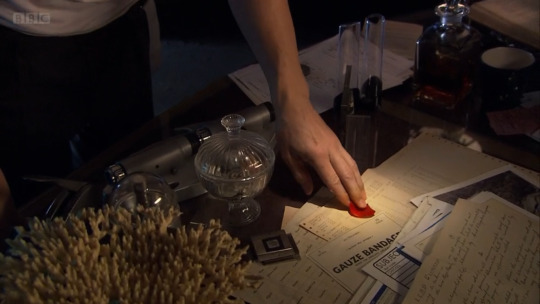
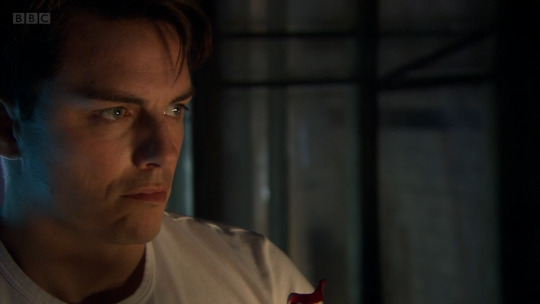
jack loses everybody he loves over and over again and as a reminder of that, rose petals.
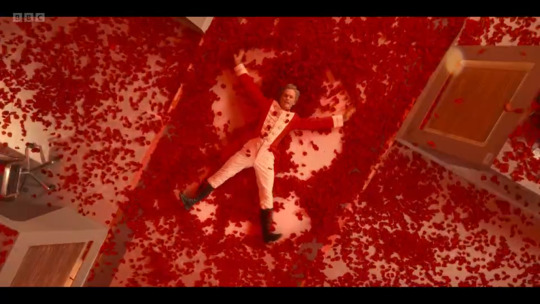
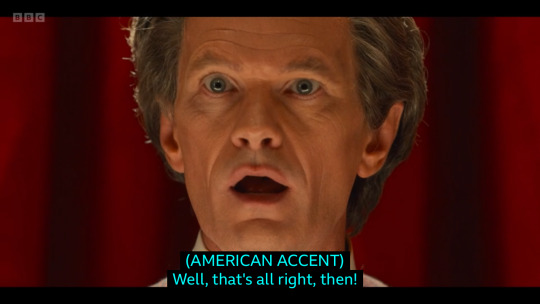
the doctor loses everybody he loves over and over again and as a reminder of that, rose petals.
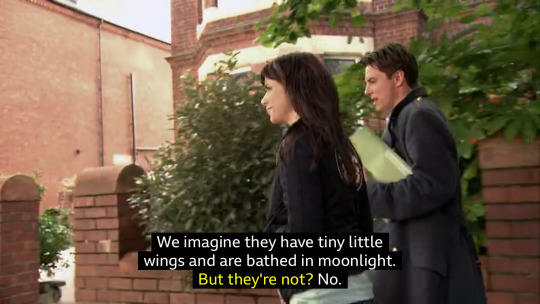
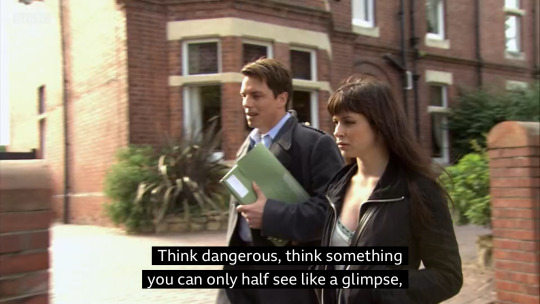
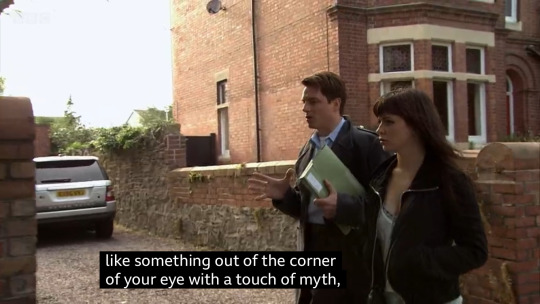

tell me that doesn’t sound remarkably similar to the way fifteen describes the goblins to ruby. the goblins are part of the toymaker’s “legions” — ancient and mysterious entities from the dawn of time, slipping in through the cracks in reality, stimulated by human belief and superstition. goblins abduct little children for their own ends and so do the “fairies”. you don’t know where the chicken or the egg is, where history ends and mythology begins: did the folklore emerge from sightings of the real creatures, or did the creatures coalesce like an egregore because of the proliferation of the folklore about them, a manifestation of humanity’s deepest fears come alive ever since the toymaker changed the rules of the game?
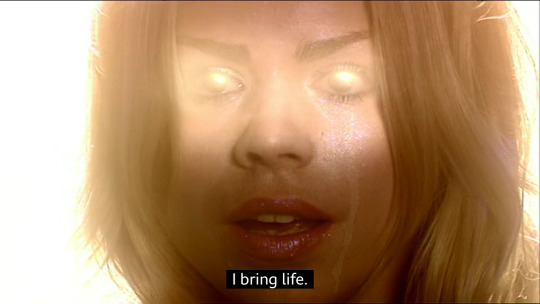
but was it the toymaker? could this all be a chain reaction, kickstarted billions of years ago (or only nineteen, depending on how you look at it) when one headstrong young woman looked into the time vortex and turned herself into a literal deus ex machina, defying all laws of reality, raising the dead and disintegrating the death-bringers? could that have been the moment (lol.) when it all began to unravel?
i haven’t seen classic who. what do i know. but maybe it wasn’t the line of salt at the edge of the universe. maybe it was one girl, seeing everything that ever was, everything that will ever happen, anything that ever could be. the fairies haven’t stopped pursuing jack ever since: he’s the living evidence of her miracle. they slaughter his entire train carriage but they don’t touch a hair on his head. other children are the fairies’ chosen ones, yes, but jack is the chosen one of their goddess. the bad wolf
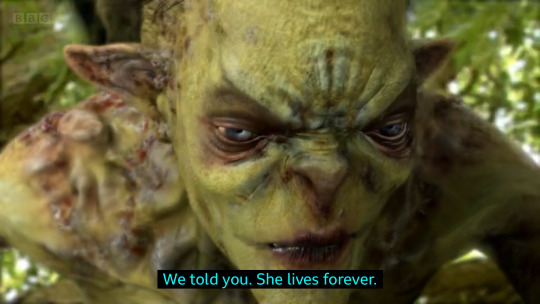
i wonder who that jonathan groff character in the upcoming series is.
#today is a day for Insane Metas. please don’t get mad at me. this is something i’d never in a million years post on r/gallifrey they would#flay me i swear. ALSO ALSO i don’t think rose is more important than other companions so martha girlies please don’t get mad at me. i don’t#even care about tenrose. it’s all about ninerose for me. and rose’s relationship to jack as his healer him as her lazarus#this post will have So many tags btw. it’s inevitable. apologies#dw#doctor who#doctor who meta#torchwood#small worlds#doctor who theory#doctor who analysis#jack harkness#tenjack#rosejack#ninejack#ninejackrose#ninerose#timepetals#rose tyler#bad wolf#the parting of the ways#the giggle#the church on ruby road#fifteen#nine#fifteenth doctor#ninth doctor#torchwood meta#the toymaker
304 notes
·
View notes
Text
Hundreds of people have said it before me, but it's really so powerful Donna's first WILLING adventure with the Doctor is an insanely emotionally moving one with a very deep message that arose from her compassion (The Fires Of Pompeii)
Even if you don't know Catherine Tate is known for her wit and comedy, Donna herself is introduced as a very comical character. Her theme is comical, her actions and sass is meant to be read as comical and both Runaway Bride and Partners In Crime have a totally different narrative structure because of it. Like, both episodes having a lot of humour based around an unexpected scenario forcing both to improvise in funny and chaotic DIY ways.
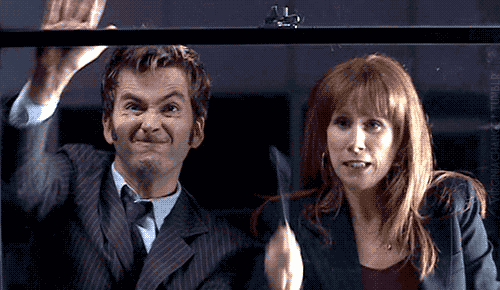
When you first watch these two episodes you have no reason to believe their run together is going to be anything else! So it was such a brilliant decision to have the episode right after she joins the Doctor be one in which SHE'S pushing a moral dilemma onto the Doctor. To be all fun and games until she learns people are going to die and the Doctor plans to do nothing about it. To then also KEEP on pushing the subject DESPITE the Doctor, this alien she at this point still knows very little about, speaking about the world and time with a sense of authority like there Truly Really is nothing they could do.
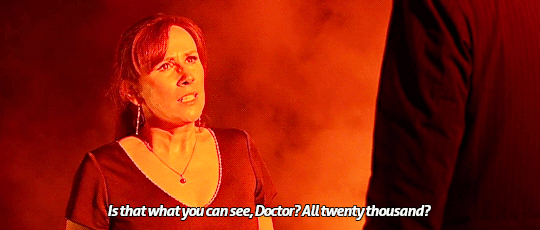
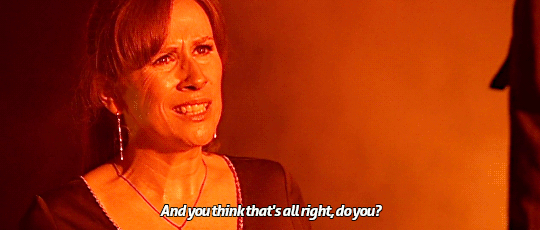
The fact that the character who's introduced to us as the comic relief IMMEDIATELY turns around and tells the Doctor he's guilty of the death of a teenager and everyone around him if he refuses to help at all... That's such a powerful move.
#like showing empathy for someone who will die is something every companion would do. but Donna made it her whole business to tell the doctor#he is WRONG and rubbing it in so heavily as to why standing by would make him guilty... that is something few dare to do#no one tells donna noble what she can and cant do and what is and isnt right. shell always be the judge of that#donna noble#the doctor#tenth doctor#10th doctor#doctor who#doctor who analysis#analysis#episode analysis#the fires of pompeii#runaway bride#partners in crime#talkies
521 notes
·
View notes
Text
“But We Love Martha Jones!” - The Doctor Who Fandom’s Selective Memory of Racism
Chapter 3 - Martha vs Bill
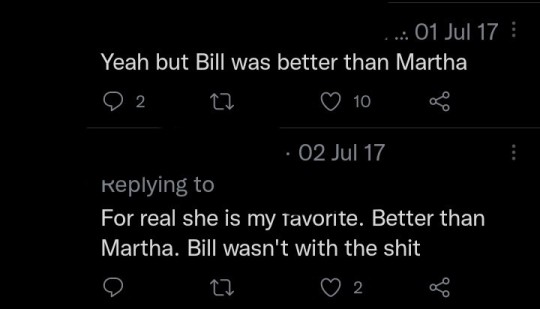
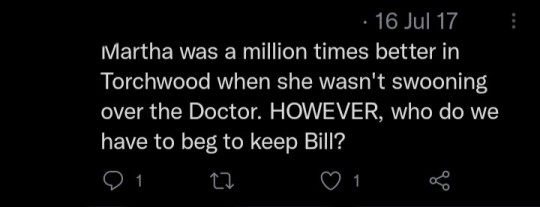

Moffat took us to a Bristol university in 2017, to meet the bright, friendly, chip-serving Bill Potts, the first Black lesbian companion of Doctor Who. Bill’s entrance wasn’t met with sunshine and rainbows either, with complaints of “PC agendas” and the accusation of her sexuality being “shoved down our throat” following her throughout Series 10. She was often called annoying and accused of being too angry. Her outbursts at Twelve weren’t fully well received, despite them only happening as a response to being emotionally manipulated and being shot and converted into a Cyberman against her will. Overreactions, right? That being said, Bill seems to have a more positive reception than Martha did and this can be pointed towards the writing. Moffat decided S10 would focus on Bill’s race and had the 12th Doctor bravely punch Sutcliff after his anti-black comments about her. This was mostly well received by the fandom and the Doctor was praised for taking initiative. How I feel about this scene and how Doctor Who handles race can be explained in way more detail for later but I can sum it up by saying I didn’t hate the scene: but I don't love it either. The racism Bill receives is barely mentioned again apart from a small comment in Oxygen, plus I see this scene constantly used to shut down any valid criticism about how race was handled in the Moffat era. Twelve is centred in this scene, not Bill. The fact this scene is referred to as “Twelve punches the racist” and not “Bill experienced racism” speaks for itself.

Leading back to Martha, a weird parallel is made between her and Bill. Yes, RTD and Moffat are different people who wrote different people but a parallel is there regardless; A brown-skinned woman expected to defend and save her white male incarnation whilst barely praised for it and constantly compared to her blonde white female predecessor, versus, the light-skinned woman who was actually defended by her white male incarnation. It's not the best look. The show set up the parallel by having Bill reference Martha’s butterfly effect conversation with Ten and the fandom carried this on. As much as I love Bill, her being held up as the Black companion “done right” has always felt wrong because not only are there critiques to be made about Moffat’s handling of Black characters too (Danny Pink anyone?), it reinforces Martha as the “failed” Black companion. “Moffat wrote Bill to do XYZ whilst RTD wrote Martha to do ABC” became “Bill did this and Martha didn’t so Bill was better Black representation!” Bill spoke about racism and Martha didn’t (even though she did in Shakespeare Code and Human Nature/Family of Blood), Bill wore her natural hair and Martha didn’t (even though Freema didn’t control the costumes), Bill did everything right (as if Martha did everything wrong).
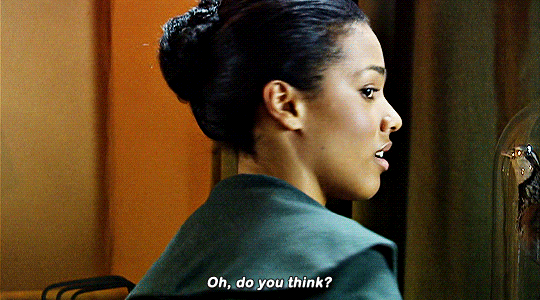
Bill being placed on the pedestal of the “perfect Black companion” not only erases the antiblackness her character also experienced but reinforces how her darker counterparts, Martha, Mickey and Ryan, “fail” in comparison and “fail” in their Blackness, over reasons the characters nor actors themselves had any control over. It really begs the question of how different Bill would’ve been treated if she was darker, but I guess we’ll never know. If we’re gonna praise and uplift POC in Doctor Who, specifically Black characters, we need to uplift them in all shades. Only supporting the lightest person in the room whilst saying they’re better than the darker ones is not the anti-racist serve this fandom thinks it is.
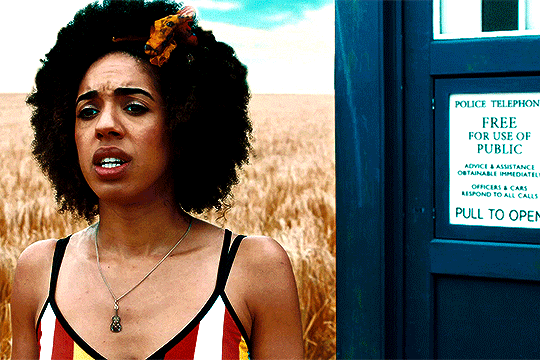
<- Chapter 2
Chapter 4 ->
#martha jones#bill potts#doctor who#doctor who fandom#dw fandom#fandom racism#antiblackness#rtd era#rtd critical#moffat era#moffat critical#colourism#colorism#fandom colourism#black representation#fandom analysis#fandom history#freema agyeman#new who#doctor who analysis#doctor who series 10#dr who fandom#rtd#rtd1#fandom antiblackness
72 notes
·
View notes
Text
i don't think it's exactly a secret that i really don't like the rose/meta crisis ending.
firstly, we lose donna because of it. but mostly because of the implications. i also view the meta crisis in multiple ways. he's a clone but he isn't. he's not the true doctor but he is. it's complicated.
but let's get into it.
first of all, the reason that he even stays with rose in the first place is because the tenth doctor thinks he's a liability which is kind of dramatic but probably an incredible bit of foresight (he can see the turn of the universe right) and self awareness considering he goes all 'timelord victorious' later. two doctors in the same universe, one who's considerably more volatile than the other would definitely be a problem. i don't think davros reversed so quickly upon seeing him for no reason.
so as a solution, he needs to be with rose so she can keep him in check. because the takeway from her character is that she is a balm for the doctor, which reads less sweet, more patronising to her as an individual. i'm not surprised that story had her refer to him as a pet because that's literally what she's doing now. keeping him on a leash lest he go feral. why they didn't just give us a moment between the meta crisis doctor and rose doing something together to sow the seeds if they wanted the viewers to be sold on this, i don't know. now, i am not dismissing the idea that this ending was supposed to be divisive, but some of the vehement defending of it on here makes me raise an eyebrow.
anyway, my secondary point is the parallel world itself. the tardis dies upon getting there the first time, with the doctor comparing it to diesel in a petrol engine. he also states that after the time war, the worlds were closed off, but before that, travelling was possible but stressed that the tardis drew on energy from it's own universe which is why it didn't work in the parallell. now, we also know from rose's absence in that world, that there is probably a lot of people missing from it or people who never existed in the first place.
so. now i am left with everything the doctor would be leaving behind staying in pete's world. he would never see his own universe again. now, the prospect of exploring an unknown universe would be probably exciting but considering timelords do not exist there, it would be a pretty hostile place for him. maybe inventing his own way to travel would be fun for him. the whole 'grow a tardis' deleted scene was always dumb to me though, because despite how organic the ninth and tenth doctor's tardis looked like, it's still a machine. i don't think you can grow timelord technology. so that's out of the question. he would never see his old companions again. donna? martha? sarah jane? none of them? and, the biggest to me - his tardis? there is no way you can convince me the doctor would accept never seeing his beloved tardis again.
the doctor's reason for living is exploring the universe and travelling in his ship. so for him to give it up to stay with rose in pete's world doesn't seem romantic to me, it feels tragic. while rose may have wanted to settle down eventually, she knew he wouldn't. and he shouldn't have too. they both wanted different things so to make her get this ending that was forced upon him feels really unfair.
the metacrisis was born out of the engine of the dalek ship and donna's fear. and maybe 1 hour later he's exiled from everyone. to live this human life he's been intriguied by but never wanted. we find it in s3 he has a whole machine to make himself human. he. doesn't want. it. but now he hasn't got a choice. and for rose to jump on him right in front of the original doctor was just the cherry on top of a selfish cake which was even crazier considering that even rose was protesting that she didn't want this either.
none of it feels great. i'd much have preferred for rose to have gotten over it and live better for her experience in pete's world. the very idea of her growing colder and more selfish felt realistic though. but i don't think she should have been rewarded for it though.
i'm just not a fan.
#doctor who#can i even tag these guys lest i get jumped?#doctor who analysis#rose tyler critical#meta crisis doctor critical
41 notes
·
View notes
Text
The Truth About The Hybrid (Doctor Who)
In the episode Hell Bent the question of the Hybrid's true nature was never quite resolved, and it hasn't been touched on since. With The Moffat Era now long over, it's doubtful that we'll ever revisit this question, which leaves the whole storyline unfinished. That being said, there are enough clues present to figure it out, with a little help from Chris Chibnall and The Timeless Children. (Oh yes, I really am going there. I tend to give Chibnall more credit than most people.) The truth is staring us in the face.
The Master is The Hybrid.
Let's consider what we know. The Hybrid was a prophecy on Gallifrey that existed well before the Time War. It spoke of a hybrid creature, cross bred between two warrior races, who would stand in the ruins of Gallifrey and break a billion hearts, just to heal their own. That is the description that is offered in the ninth season. We know that the Timelords were obsessed with this idea, even after The Time War ended. Gallifrey had been saved, and The Hybrid was still out there somewhere, the catastrophe yet to come. First and foremost, I doubt the Timelords knew that The Master would be The Hybrid. It's more likely that they expected the Hybrid to emerge during the Time War. We know they restored The Master and gave them a whole new set of regenerations. They probably wanted to use The Master to fight the Hybrid.
As for what the Timelords were thinking, the most popular theory was that the creature was cross bred between Timelords and Daleks, and even Davros seemed to think that this was true. That he was fulfilling the prophecy by stealing The Doctor's regeneration energy during The Witch's Familiar. However, Hell Bent makes it specifically clear that any warrior race can technically qualify, including humans and even The Mire from The Girl Who Died.
Season 9 concludes with no real definitive answer about The Hybrid.
Davros suggests that it is a Dalek/Timelord crossbreed. The Doctor later dismisses this idea, suggesting that the Daleks would never allow this. Disregarding the fact that their creator himself posed this theory, a Dalek crossing its DNA with another creature has already happened in the series. Like, more than once. So that idea is nonsense. The Doctor goes on to say that he himself is the Hybrid. Which would tie in with The Eighth Doctor's claim that he's half-human, and Ashildr even proposes this as a theory. However, like Twelve said, it wouldn't make much sense for him to flee Gallifrey to escape himself. Really, whether or not The Doctor knows anything about The Hybrid, and what he knows, if anything, is exceedingly vague until the very end. Especially since he goes around dropping random references to the Hybrid during the season, like he's trying to figure out what it is. Hell Bent settles on the explanation that The Doctor and Clara together, form the Hybrid. Because they've become too dangerous to keep traveling together, pushing each other to such extremes. But there's kind of a big problem with that idea.
A Hybrid can't be two people.
That's not what a Hybrid is, or how it works. You would have to call it something different. Still, while The Doctor's knowledge on this subject is very unclear, I think we can point to one definitive moment as iron-cast proof that The Doctor knows the truth about the Hybrid, and that the truth frightens him. He says as much to The Veil in Heaven Sent. He says that he lied about the real reason why he left Gallifrey. That truthfully, it was because he feared the Hybrid. And this is the key detail - The Veil then freezes in place. It stops chasing him. Earlier in the episode, it was directly established that The Veil can be compelled to temporarily pause it's pursuit if The Doctor makes confessions. Tells secrets, truths, that he's never told before. Considering that he's inside his own Confession Dial, I don't doubt the the abilities of The Veil. It was never shown to be fooled in any other instance, so if The Doctor was lying about this...why wouldn't it know?
Meaning that whatever he said in Hell Bent about being the Hybrid himself, or that he actually has no idea who or what it is...The Doctor is lying. He does know. He must. He knows exactly who The Hybrid is, and for whatever reason, he's refusing to admit as much. He spends over four billion years in his own personal hell, all because he refuses to give up the secret of The Hybrid. Clara even asks him "Why would you do that to yourself?" and The Doctor doesn't really have an answer to give.
Let's fast forward to Season 12 for a moment. The Master has discovered the truth about The Timelords, The Doctor, and their history as The Timeless Child. This knowledge breaks The Master, it hurts them to their very core. If we assume that this incarnation is post-Missy, then this also means that The Master is in so much pain, that it set back all their growth during Season 10. What do they do to cope with it? Why, genocide of course. They slaughter everyone in The Capitol, and presumably on the rest of the planet. Hell, I wonder if they used The Moment. Not a part of this theory, just...an interesting question to think about. At the end of it all, The Master stood in the ruins of Gallifrey, responsible for it's demise. "Look upon my work, Doctor, and despair." And why did he do this? Because he was hurting, and he wanted revenge. "I had to make them pay for what I discovered." He broke a billion hearts just to heal his own. Now, this setup is almost perfect, but it's missing one key component. The Master isn't a hybrid, is he? No, he's a full blood Timelord, as far as we know.
Or at least he was, until he bonded with the Cyberium.
"All Cyber knowledge...all Timelord knowledge...put it together, and what do you get?" You get a Hybrid creature is what you get. The Cyberium is shown to be a living creature as well as a computer, and The Cybermen certainly qualify as a warrior race. The Master practically announces his status as the Hybrid by taking the remains of The Timelords and converting them into the "Cyber Masters" which are also arguably an entire race of hybrids. Now, I'm not the first person to propose this idea, that the Hybrid Prophecy referred to The Master during the events of The Timeless Children. But I'm going to take this one step further, and talk about The Doctor. About what was going through their mind during Hell Bent, and throughout the entire series. Because The Master is The Hybrid, but here's an even bigger mind-screw for you.
The Doctor knew all along.
They may not have known the details, or how exactly things would play out. But they have known ever since they ran away from Gallifrey that The Master would one day become the Hybrid. This is the only reason, the only truth I can see, that would explain everything. Not just why The Doctor fled, but also explain their inconsistency about this subject. They ran...because they saw their best friend's future. Saw him turned into a monster that would massacre The Timelords. Perhaps The Master was already taking their first steps down a path of darkness, and The Doctor's worst fears were confirmed by learning this secret.
Twelve recounts the story of a boy who got lost in the Cloisters, who was told a terrible secret by the Wraiths, and that he was never right in the head again, which led him to "steal the moon and the president's wife." We also know that this story was about The Doctor, and that it was in fact the president's daughter. Susan Foreman perhaps? Eh, it's a theory for another time. The scene then transitions into the discussion of the Confession Dial, and the secret that The Doctor guarded so closely that he spent billions of years punching through a diamond wall rather than give it up. Considering that, in the very next season, he vows to spend a thousand years guarding Missy in the vault and dedicates himself to the task of trying to redeem her? Yeah, I can believe that he would still be protecting his oldest friend after all this time.
The Doctor has a real blind spot when it comes to The Master, always trying to turn them back to the light, and refusing to let any other characters kill them even in situations where it's really not The Doctor's call to make (The Year That Never Was comes to mind) Noticeably, the one time that The Doctor "allows" someone else to kill The Master is Ko Shamus in The Timeless Children. Which occurs after the prophecy would have been fulfilled.
So there you have it. The Master is The Hybrid, they always have been. And The Doctor knew, they knew from the beginning. They just hoped against hope that they could get through to their old friend before this happened. And they very nearly did, too. Judging by The Doctor Falls, The Master came this close to turning over a new leaf. But The Timelords had to ruin that as well.
#Doctor Who#Doctor Who Theory#Doctor Who Headcanons#Fandom Headcanons#Fandom Analysis#The Doctor#The Master#Doctor Who Analysis#The Twelfth Doctor#The Thirteenth Doctor#The Spymaster#Hell Bent#The Timeless Children#The Hybrid#Ashildr#Missy
35 notes
·
View notes